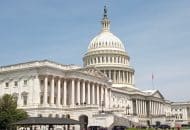Trading Fair Trade for EU Tech Regulations
COMMENTARY

The European Union’s aggressive regulatory approach to large technology platforms continued last week when it launched investigations into Apple, Alphabet and Meta under its new digital regulations. It’s the first shoe to drop since two new laws, the Digital Markets Act and the Digital Services Act, went into effect earlier this year. These investigations could result in substantial fines.
Four days after the announcement of the investigations, the Office of the U.S. Trade Representative issued its National Trade Estimate report, which dropped the EU’s digital regulations from its annual list of trade barriers, deferring to the “public interest” of foreign governments.
That means when our trade officials in the coming days meet with their EU counterparts in Belgium in a scheduled trade and technology meeting, they will presumably not be pressing the EU on a range of obvious issues connected to the new laws.
Historically, our trade representatives would, at the very least, question why 14 out of the 17 companies subject to the new laws are U.S. companies, and five of the six designated “gatekeepers” are American, meaning our biggest tech companies — Google, Apple, Amazon, Microsoft and Meta are subject to the most stringent regulations.
Instead, our policymakers have acquiesced.
The USTR recently explained that its traditional role — looking out for the interests of U.S. companies and addressing potential global trade barriers — is outdated thinking, and that the EU’s new tech rules have brought “increased nuance” to digital economy issues.
The DMA and DSA are the very definition of trade barriers — regulations designed to impede access to another country’s market.
President Joe Biden is focused on reinvigorating the nation’s chip industry and knocking down trade barriers in China and elsewhere to promote U.S. companies and its workers. The current trajectory of our digital trade policy appears to be at odds with the president’s stated goals.
The Europeans have a long track record of aggressive trade protection, including an array of restrictions imposed on American film, TV and musical content within their countries. Rather than fighting the new restrictions imposed on tech companies, American officials seem to be aiding and abetting them.
I understand why some of these administration officials favor the EU’s regulations. They view the tech companies as dominant players in their realms and believe they employ a multitude of strategies to thwart competitors. However, if they believe some controls should be put on those companies, they should build the case for it in Washington, D.C., not in Brussels, Belgium.
We’re at a pivotal moment in American economic history, with the Biden administration, by and large, aiming to safeguard American workers and solidify industries anchored in this country. The American companies targeted by the EU collectively directly employ more than 1 million workers domestically.
That figure doesn’t count all the companies that do business with the giants in one form or another — be it law firms, banks, mobile app companies, delivery services or a plethora of online small business companies. Estimates suggest more than 3 million direct and indirect U.S. jobs are tied to their digital ecosystems.
Fostering competition in the tech industry is an important goal.
Attempting, however, to achieve this through rules that penalize American companies while benefiting European and Chinese interests is not the path we should pursue.
As trade discussions continue this year — with heavy fines looming for U.S. companies — it would behoove our trade representatives to remember that it is their job to knock down trade barriers, while it is the job of other administration agencies to consider internet regulations.
If it’s a trade barrier, let’s knock it down, not prop it up. That’s in our public interest.
Mark Horan is a former congressional staffer who worked on trade, telecom and internet policy issues, and is currently a consultant based in Massachusetts. He can be reached on LinkedIn.
























